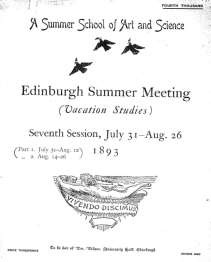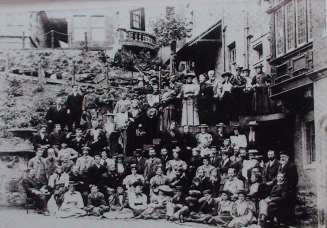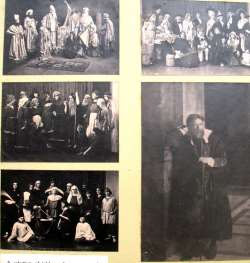GEDDES AS EDUCATOR

Patrick Geddes lived at the dawn of an era dominated by the new ideas in biology and the concept of evolution proposed by Charles Darwin. For him education was not to be seen as one of his manifold activities, because for Geddes education was “the activity” that would move forward the Ascent of Man towards a better future. Geddes proposed that if we studied our society in depth (social history) it is possible to identify trends for the future, like the buds in spring will tell you what the summer crops will be like. Geddes was sure that human potential could be improved through education, therefore education was the key to rise quality of life in the future.
Geddes saw that new technology would bring about rapid development. He was not anti-technology, but he foresaw that it would give us the means to kill and pollute our natural environment on a greater scale than ever before. Seeking to avoid this, he devoted his life to finding a way forward to a new cultural era. He held on to the view that the environment could be controlled by conscious and well-informed choices made by informed individuals.
His quest for a new kind of evolutionary education and of knowledge therefore became first priority. He went back to first principles in relation to how people learn and what methods of education were most appropriate. His motto “Vivendo Discimus” or “By Living We Learn” was meant to be a spur to action. There was no end to this search.
He was standing at the cusp of a new cultural era and sought to create a new subject which he called “Civics”. This was a discipline directed both towards reclaiming human individual creativity and the improvement of the environment.
In some of his thinking machines he tried to plot the interaction between the structure and the process in a system of education. In his model he included the feelings, the thoughts and the experience of individuals, because it is feelings and sense and thought which are important in releasing creativity. Geddes, in his Summer meetings, prepared a magnificent banquet of lectures, visits excursions, concerts and practical work and invited people to tuck in and enjoy it. After all, this was holiday time. It was as far away from any formal school than you can ever imagine. The objective was not to train in some skill or other and get a piece of paper or certificate at the end of it. Far from it. This was education where the students could choose their own courses and preferences freely, or change them every day if they so desired. This kind of freedom would be unthinkable for the rigid programmes of formal education.
The combination of his own unique education and his repeated failure to obtain a senior post in a British university undoubtedly contributed to Geddes’ disenchantment with the educational establishment. At the Summer Meetings in Edinburgh he introduced an interdisciplinary approach employing eminent thinkers from different countries and when he took up the post in Dundee his teaching methods there were unconventional, harking back to his childhood. In the first year he made plans for a garden in the University to provide practical experience for the botany students as a basis for experimental work. It was laid out diagrammatically with plant species allocated to specific areas in accordance with an overall system which Geddes would expound during classes held on walks around the garden. Geddes was not opposed to the traditional “Germanic” system of university disciplines, but he believed that academic freedom had been debased by state interference, especially in Germany itself where “Prussicating influences and imperial megalomania” had prepared the way for the war. During the period of reconstruction after 1918, he saw a new approach to education playing a vital role in building the society which could effect the transition from the “Palaeotechnic” to the “Neotechnic” age — from an age when man was dominated by his resources and techniques to one in which he could control them.
SUMMER SCHOOLS
The main reason for organising his Summer Meetings in Edinburgh was to test his ideas and methods on real people, hoping to help the participants understand more about themselves and their environment. The Summer Schools were different from the beginning, aimed at widening access to higher education and the first gathering of its kind in Europe They were seen as eccentric and somewhat for a minority interest. They reached their peak in 1890s when they attracted up to 120 attendees. The Summer Schools were held at Ramsay Gardens, but at least one of the meetings was held at Riddles Court.

Summer School Gathering 
Social Studies Programme 
Edinburgh Summer Schools
CHILDREN’S ENVIRONMENTAL EDUCATION
Geddes maintained that environmental ideas should be taught an early age and in collaboration with the teachers from the Old town of Edinburgh especially from the Castlehill School, he put his ideas into practice by keeping the children, both boys and girls, at school only in the mornings learning the usual diet of three “Rs” of the Victorian school with a change. Under his influence they were taught by his three “Hs” rule; that is:
First Heart, engaging their curiosity and sense of wonder; next Hand, touching, feeling, and working directly with a subject; and finally, Head, conceptualisation and internalisation of ideas derived from experience and reflection.
In the afternoons he himself took the children on walks, to the Pentlands, Arthur Seat or the Water of Leith and taught them about Life by direct observation of nature (geology, geography, biology,botany became alive under his spell).
He converted his headquarters at the Outlook Tower into a ‘Sociological Laboratory’ designed to change attitudes amongst ordinary people and promoted informed citizen’s participation in the running of the city. In Edinburgh, Geddes was also involved in The Botanic Gardens, The Zoo, The Water of Leith and the Roseburn development.

GEDDES’ EDUCATIONAL LEGACY
- the introduction of Social Sciences into University curricula
- the concept that society’s progress can be studied and eventually guided
- the importance of the individual’s care for its own environment reclaiming individual creativity (Responsible individuals)
- the concept that fieldwork and civic action are better than indoor study and book writing
- the importance of health as wealth, learning to keep a healthy mind and a healthy body (Bio-regions and healthy food systems)
- the creation of a new subject called ‘Civics’ directed towards the individual’s full participation in city government through awareness and informed action.
